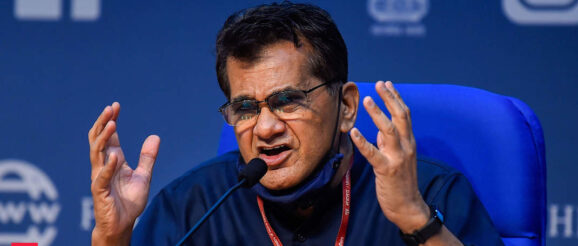Covid-19 accelerating innovation in mobility, says Ola’s Bhavish Aggarwal – Times of India

BENGALURU: The Covid-19 pandemic is accelerating innovations in the urban mobility and transportation business with a push towards electric vehicles and subscription-based ownership models, said Bhavish Aggarwal, CEO and co-founder of ride-hailing major Ola. While the initial impact of the pandemic on the industry was hard, it also provides an opportunity for new business models to come up, said 35-year-old Aggarwal while addressing students joining Bennett University on Monday. Bennett University is part of the group which publishes The Times of India.
“Transformation will accelerate because of Covid-19 because it will lead to more innovations around safe and hygienic mobility solutions. Public transportation will undergo a fundamental change over the next 3-5 years because the need is to have safer solutions,” said Aggarwal, an engineer from IIT Bombay who started Ola in 2010 after a stint at Microsoft. Ola is present in 250 cities, expanding beyond India to the UK, Australia and New Zealand in the last few years.
He said that consumer behaviour will undergo a change due to the pandemic. “People will need personal mobility solutions because everyone feels safer in their own vehicle, but everyone cannot afford one, even a two-wheeler. New businesses will emerge allowing people to use the vehicle as a service, or you subscribe to a vehicle for six months instead of buying it,” he said in a webinar addressing hundreds of students.
Aggarwal also said that youth of the country will also increase acceleration towards the adoption of electric vehicles, and it is also one of the focus areas for Ola. “We are also now looking to build a leading electric mobility company where we will design and manufacture electric vehicles for the future,” said Aggarwal. The company had spun out its electric vehicle unit Ola Electric Mobility last year, which is backed by investors like Softbank and Tiger Global and valued over $1 billion.
Aggarwal also told students that given the talent pool, open economy with the world, large English speaking workforce, tough cost structures and high customer expectations, businesses which can scale in India can be taken to global markets. He also said that while when he was passing out of IIT Bombay many students were looking to go study or get a job abroad, now the youth of the country “aspires to build businesses and careers in India, and contribute to India’s transformation.”
“Indian companies have a unique opportunity in this future era – leveraging India as a large market, the entrepreneurial talent and the depth of technology and engineering talent – we can actually create global solutions,” he said.
“Transformation will accelerate because of Covid-19 because it will lead to more innovations around safe and hygienic mobility solutions. Public transportation will undergo a fundamental change over the next 3-5 years because the need is to have safer solutions,” said Aggarwal, an engineer from IIT Bombay who started Ola in 2010 after a stint at Microsoft. Ola is present in 250 cities, expanding beyond India to the UK, Australia and New Zealand in the last few years.
He said that consumer behaviour will undergo a change due to the pandemic. “People will need personal mobility solutions because everyone feels safer in their own vehicle, but everyone cannot afford one, even a two-wheeler. New businesses will emerge allowing people to use the vehicle as a service, or you subscribe to a vehicle for six months instead of buying it,” he said in a webinar addressing hundreds of students.
Aggarwal also said that youth of the country will also increase acceleration towards the adoption of electric vehicles, and it is also one of the focus areas for Ola. “We are also now looking to build a leading electric mobility company where we will design and manufacture electric vehicles for the future,” said Aggarwal. The company had spun out its electric vehicle unit Ola Electric Mobility last year, which is backed by investors like Softbank and Tiger Global and valued over $1 billion.
Aggarwal also told students that given the talent pool, open economy with the world, large English speaking workforce, tough cost structures and high customer expectations, businesses which can scale in India can be taken to global markets. He also said that while when he was passing out of IIT Bombay many students were looking to go study or get a job abroad, now the youth of the country “aspires to build businesses and careers in India, and contribute to India’s transformation.”
“Indian companies have a unique opportunity in this future era – leveraging India as a large market, the entrepreneurial talent and the depth of technology and engineering talent – we can actually create global solutions,” he said.
